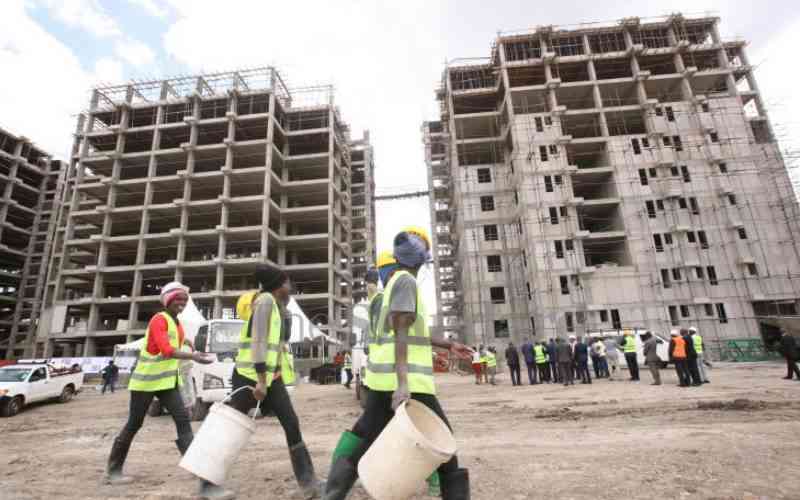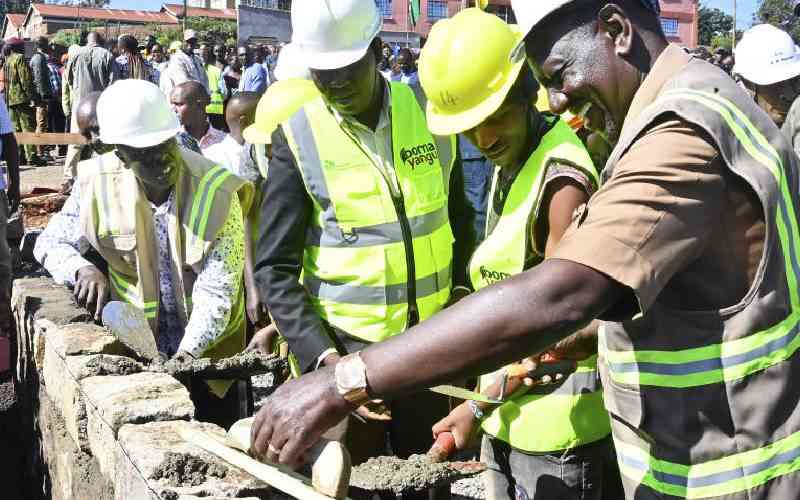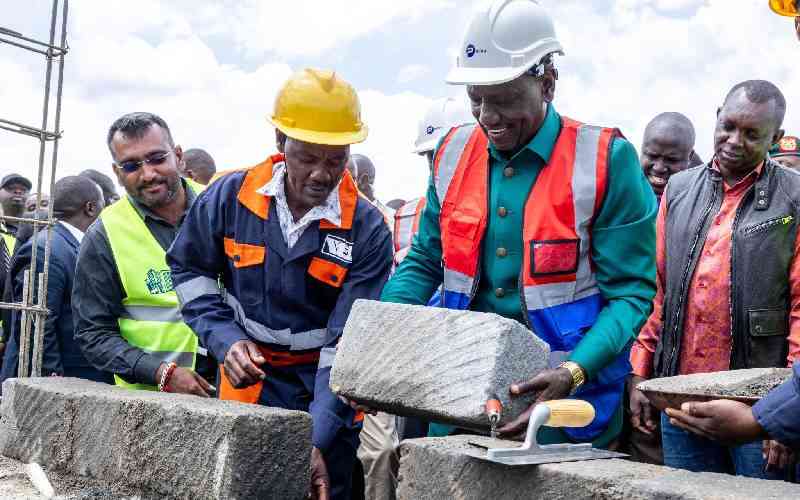 |
|
A cement production plant. [PHOTO: FILE/STANDARD] |
By PONCIANO ODONGO
Recent increase in cement prices after the introduction of a new levy on finished cement products is likely to slow down the growth of the housing sector, players say.
Through a special gazette notice, Mining Cabinet Secretary Najib Balala directed that cement manufacturers pay Sh140 to the government for every tonne of cement produced or Sh7 per 50 kilogramme-bag of cement beginning this year.
Manufacturers have opposed the new rates that effectively increase the cost of cement production. To be affected most are those who build their own houses and cannot buy building materials in bulk.
Through the regulations, the minister has also revised the royalties for fluorspar products to be backdated to July last year.
Under the new rules, fluorspar products are levied at two per cent of the gross sales value for the period between July 2013 and June 2015. Between July 1, 2015 and June 30, 2017, the products will be levied at three per cent of the gross sales value.
Another new rate of four per cent will be levied on the products in 2017 and 2018 before being raised to five per cent in July 2019. Fluorspar is the raw material for steel making, iron and steel casting, primary aluminium production, glass manufacturing, welding rod coatings and cement production.
According to Alfred Aluvaala, a building economist and project manager at Miradi Consultants in Nairobi, the move by the government means building materials will cost more, with the consumers ultimately bearing the burden.
“When an important product like cement is touched by the government, a larger population — producers, manufacturers and consumers — are affected,” said Aluvaala, noting that manufacturers and producers will pass on the levy to consumers who may find the final product unaffordable.
Competition
Competition brought about in the cement industry by new entrants over the last few years has led to reduced cement prices. With the new levy, that is no longer the case.
Already, some cement manufacturers have adjusted the prices upwards while others are warming up to do so, a move the Ministry of Mining has termed unacceptable and a betrayal of agreement made between the ministry and the industry.
Cement prices have remained stable over the past five years, retailing at between Sh600 and Sh750 per bag.
Balala said the decision to impose a levy on finished cement products was reached after a long consultative meeting with cement makers in his office, and wondered why the manufacturers had raised their prices by more than Sh20 per bag.
Mary Muthui, Director of BenMa Hardware Ltd, a cement distributor and retailer who also doubles up as a land developer, said the increase in cement prices is a big blow to the construction industry.
Stay informed. Subscribe to our newsletter
“In Kenya, it is almost impossible to construct houses without cement; increasing its price will result in increased costs and expenses, leading to lower demand. Developers will dig deeper into their pockets, meaning it will cost more to buy a house,” said Muthui.
One of the major factors affecting the housing sector is the escalating cost of building materials, which leads to high cost of housing units and related infrastructure.
A report by the National Housing Corporation last year indicated that the high cost of construction, coupled with the high cost of finance, made owning a house unaffordable for the majority of low- and middle-income earners.
NHC Managing Director Wachira Njuguna announced two weeks ago that the corporation is will build 30,000 units annually countrywide.
While officiating the ground breaking ceremony of Great Wall Apartments II in Mlolongo late last year, Land, Housing and Urban Development Cabinet Secretary, Charity Ngilu, regretted that Kenya had not realised its dream of providing decent housing for a large section of the population due to a host of challenges, including poor economic performance, increased poverty levels and high cost of financing.
According to Savannah Cement Managing Director Ronald Ndegwa, the new levy on cement will stifle demand and negatively impact on growth in the construction industry. “Everything possible needs to be done to bring down construction costs to narrow the gap between demand and supply of housing in the country,” he said, noting that the government should support the cement industry more to ensure that it has a competitive edge in the region.
He added that the fact that the new levy has come hot on the heels of the recent increase in power tariffs for large-scale consumers did not augur well for the construction industry.
“We are optimistic that the ministry will lead industry efforts to address the spiralling production costs to cushion the sector from a likely decline,” he said.
Bamburi Cement, the market leader in the country, was the first to increase cement prices — by Sh20 per bag — mid last month but got a negative response from its distributors and consumers and had to revert to its earlier prices.
Mary Muthui, a Kitengela-based cement distributor, said Bamburi Cement raised its prices on January 10 to Sh660 from Sh640 but was forced to revert to the old prices after its main competitors failed to do so.
Price increase
National Cement, a member of the Devki Group and maker of Simba Cement, increased its cement prices from Sh600 to Sh625 per 50-kilogramme bag. It had reviewed its price down on October 1 last year.
“We are reviewing the recent changes in tariffs and levies (including the mining levy) and their implications to our business, market and cost dynamics to determine the options available for us,” said Bamburi’s Corporate Affairs Director, Susan Maingi.
She said honour its pledge in the Vision 2030 medium-term plan to grow the manufacturing sector in order to achieve a Gross Domestic Product (GDP) of 10 per cent by 2017.
“Anything affecting the manufacturing and construction sectors could affect the realisation of Vision 2030,” she said.
Early last month at Ilbisil, East African Portland Cement Company Managing Director Kephar Tande said that the levy would lead to increased cost to manufacturers and predicted increase in prices.
“Our company will face increased costs and reduced margins. Overall costs of construction are expected to go up due to the levy imposed on final cement product. Energy costs have gone up at the same time as the new levy increasing upward pressure on prices,” said Tande.
 The Standard Group Plc is a
multi-media organization with investments in media platforms spanning newspaper
print operations, television, radio broadcasting, digital and online services. The
Standard Group is recognized as a leading multi-media house in Kenya with a key
influence in matters of national and international interest.
The Standard Group Plc is a
multi-media organization with investments in media platforms spanning newspaper
print operations, television, radio broadcasting, digital and online services. The
Standard Group is recognized as a leading multi-media house in Kenya with a key
influence in matters of national and international interest.
 The Standard Group Plc is a
multi-media organization with investments in media platforms spanning newspaper
print operations, television, radio broadcasting, digital and online services. The
Standard Group is recognized as a leading multi-media house in Kenya with a key
influence in matters of national and international interest.
The Standard Group Plc is a
multi-media organization with investments in media platforms spanning newspaper
print operations, television, radio broadcasting, digital and online services. The
Standard Group is recognized as a leading multi-media house in Kenya with a key
influence in matters of national and international interest.









